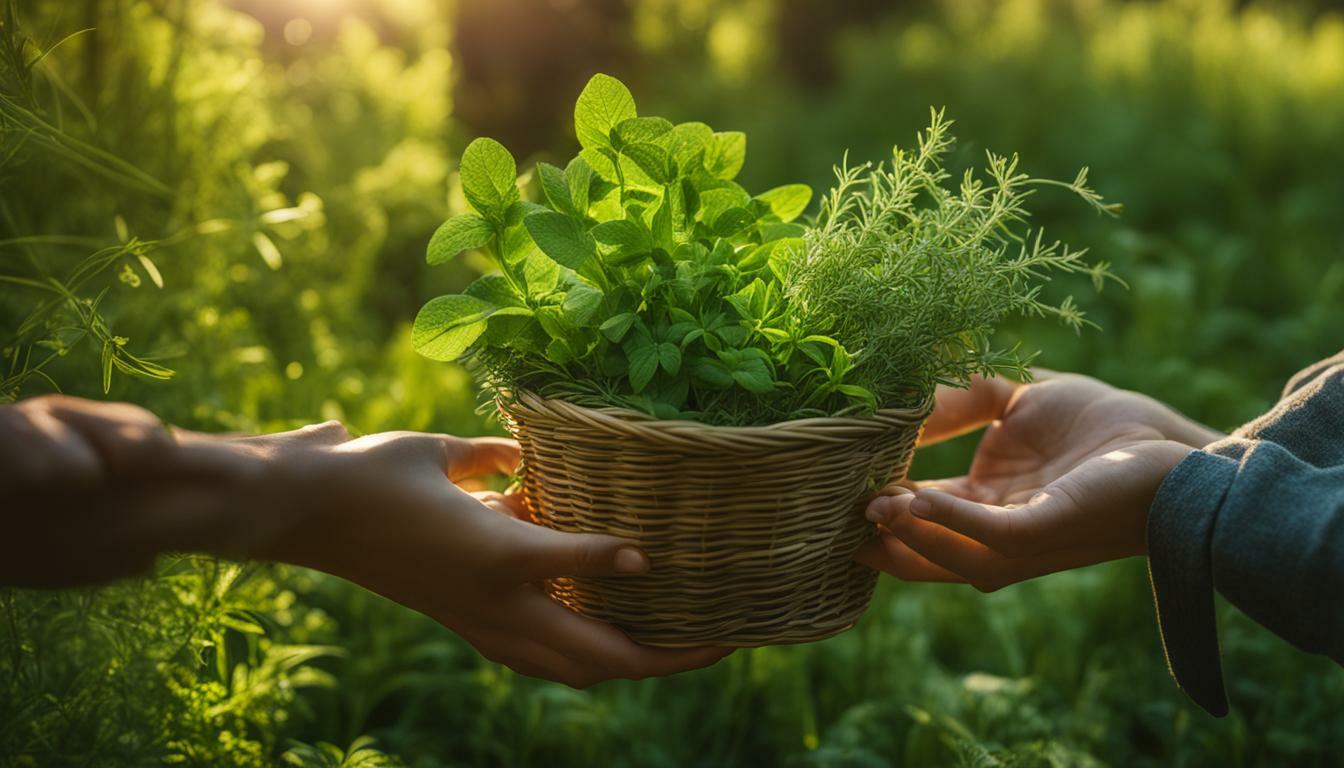Welcome to our guide on overcoming addiction naturally with the power of herbal medicine. In this section, we will explore how herbal medicine can be a valuable tool in the journey towards recovery from addiction. By harnessing the healing potential of various herbs, we can address common symptoms experienced during recovery and support both physical and mental well-being. Let’s dive in and discover the benefits of herbal medicine for addiction.
- Herbal medicine can be a natural approach to overcoming addiction.
- Specific herbs like lemon balm, valerian, skullcap, reishi, and ashwagandha can assist in addiction recovery.
- Herbal supplements can support detoxification and restore essential nutrients.
- Certain herbs can promote mental well-being and emotional support during the recovery process.
- Consulting with a healthcare professional is crucial before incorporating herbal medicine into a routine.
The Benefits of Herbal Medicine for Addiction Recovery
Discover the numerous benefits of herbal medicine for addiction recovery and explore alternative options for your journey towards recovery. In addition to traditional addiction treatment methods, herbal supplements can be a valuable tool in supporting your body and mind during the recovery process.
Herbal medicine offers a natural approach to addiction recovery, with herbs that have been recognized for their healing potential. These herbs can help alleviate common symptoms experienced during recovery, such as insomnia, loss of appetite, and irritability. By incorporating herbal allies into your routine, you can enhance your overall well-being and increase your chances of successful recovery.
Some notable herbal allies for addiction recovery include:
- Lemon balm: Known for its calming properties, lemon balm can help reduce anxiety and promote better sleep.
- Valerian: Valerian root has sedative effects that can aid in relaxation and improve sleep quality.
- Skullcap: This herb is known for its anti-anxiety and mood-stabilizing properties.
- Reishi: Reishi mushrooms have adaptogenic properties, which can help the body cope with stress and support overall well-being.
- Ashwagandha: Ashwagandha is an adaptogenic herb that can reduce anxiety and improve mental clarity.
These herbs offer a holistic approach to addiction recovery, addressing both physical and mental well-being. They can support detoxification, improve mood, reduce anxiety, and promote better sleep, ultimately aiding in your journey towards a healthier and addiction-free life.
| Vitamins and Nutrients for Addiction Recovery |
|---|
| Vitamin B |
| Amino Acids |
| Zinc |
| Iron |
| Calcium |
| Magnesium |
| Omega-3 |
Alongside herbal medicine, it’s important to restore essential nutrients that may have been depleted as a result of addiction. Adding certain vitamins and minerals back into your body can help restore balance and promote overall health. Vitamin B, amino acids, zinc, iron, calcium, magnesium, and Omega-3 are all vital for supporting your physical and mental well-being during the recovery process.
It’s crucial to consult with a healthcare professional before incorporating any herbs or supplements into your routine, especially if you’re currently taking medications. They can provide guidance on the appropriate dosage, potential interactions, and ensure that herbal medicine is a safe and effective addition to your addiction recovery journey.
By harnessing the power of herbal medicine and incorporating essential nutrients, you can enhance your chances of a successful and holistic recovery from addiction. Remember, recovery is a personal journey, and exploring alternative options such as herbal medicine can play a significant role in your overall well-being and long-term sobriety.

Explore the power of herbal allies such as lemon balm, valerian, skullcap, reishi, and ashwagandha in overcoming addiction and learn how they can provide natural relief during recovery.
When it comes to addiction recovery, herbal remedies can offer a gentle and holistic approach to healing. These herbs have been used for centuries and are known for their therapeutic properties. Lemon balm, for example, has calming effects that can soothe anxiety and promote better sleep. Valerian is another herb that aids in relaxation and can help alleviate withdrawal symptoms.
Skullcap is a powerful herb that promotes a sense of calmness and balances mood swings. It can also assist in reducing cravings and supporting detoxification. Reishi, often referred to as the “mushroom of immortality,” has immune-boosting properties and can strengthen the body during the recovery process. Ashwagandha, an adaptogenic herb, helps the body adapt to stress and can provide mental and emotional support during addiction recovery.
By incorporating these herbal allies into your recovery journey, you can tap into the natural healing power of plants. However, it’s important to remember that herbs are not a substitute for professional medical advice. Before integrating any herbal remedies into your routine, consult with a healthcare professional to ensure they are safe and suitable for your individual needs.
| Herb | Benefits |
|---|---|
| Lemon Balm | Promotes better sleep and soothes anxiety |
| Valerian | Aids in relaxation and alleviates withdrawal symptoms |
| Skullcap | Provides calmness, balances mood swings, and supports detoxification |
| Reishi | Strengthens the body and boosts the immune system |
| Ashwagandha | Provides mental and emotional support, helps the body adapt to stress |

Remember, recovery is a unique journey, and what works for one person may not work for another. It’s important to find the right balance of holistic approaches, including herbal medicine, in conjunction with professional guidance and support.
Supporting Detoxification with Herbal Supplements
Learn how herbal supplements can assist in the detoxification process and support your journey towards freedom from substance dependence. Herbal medicine has long been recognized for its therapeutic properties, and when used correctly, it can be a powerful tool in promoting detoxification and overall well-being during addiction recovery.
During the detoxification process, the body eliminates toxins accumulated from substance abuse. This can often lead to uncomfortable withdrawal symptoms, such as nausea, headaches, and cravings. Herbal supplements can help alleviate these symptoms and support the body’s natural detoxification pathways.
One herb that has gained attention for its detoxifying properties is milk thistle. This herb contains a compound called silymarin, which has been shown to protect the liver and promote its regeneration. Milk thistle can help the liver eliminate harmful substances and reduce liver damage caused by substance abuse.
Another herb commonly used to support detoxification is dandelion root. Dandelion has diuretic properties, aiding in the elimination of toxins through increased urine production. Additionally, dandelion root promotes digestion and stimulates bile production, further supporting the body’s detoxification processes.
| Herb | Benefits |
|---|---|
| Milk Thistle | Protects the liver, promotes regeneration, aids in detoxification |
| Dandelion Root | Diuretic properties, supports digestion, stimulates bile production |
| Burdock Root | Purifies the blood, aids in liver detoxification, supports skin health |
Other herbs that can assist in detoxification include burdock root, which purifies the blood and aids in liver detoxification, and ginger, which supports digestion and helps reduce nausea and vomiting often associated with withdrawal symptoms. Incorporating these herbs into your detoxification regimen can help promote a smoother recovery process.
It’s essential to consult with a healthcare professional before incorporating any herbal supplements into your routine, especially if you are taking medications or have underlying health conditions. They can provide guidance on dosages, potential interactions, and ensure that herbal treatments are safe and effective for your specific situation.

In conclusion, herbal supplements can play a valuable role in supporting detoxification during addiction recovery. Milk thistle, dandelion root, burdock root, and ginger are just a few examples of herbs that can aid in the elimination of toxins, support liver health, and alleviate withdrawal symptoms. However, it’s crucial to seek professional advice before starting any herbal regimen to ensure safety and efficacy.
Restoring Health with Essential Nutrients
Discover the vital role that essential nutrients play in restoring health during addiction recovery and learn which vitamins and minerals can support your healing journey. When overcoming addiction, your body may have become depleted of important nutrients that play a key role in maintaining overall health and well-being. By replenishing these essential vitamins and minerals, you can support your body’s natural healing processes and aid in the recovery process.

Incorporating certain vitamins and minerals into your daily routine can help restore balance to your body and support the recovery process. It is important to note that while supplements can be beneficial, a well-rounded diet should be the foundation of your nutrient intake. Here are some key vitamins and minerals to focus on:
- Vitamin B: This vitamin is essential for overall brain health and can help regulate mood and reduce stress. It is often depleted in individuals with addiction. Good sources of Vitamin B include whole grains, leafy greens, and lean meats.
- Amino Acids: Amino acids are the building blocks of protein and play a vital role in repairing and restoring the body. Including sources of protein in your diet, such as lean meats, eggs, and legumes, can help replenish amino acid levels.
- Zinc: Zinc is important for immune function and can help reduce inflammation. It can be found in foods like oysters, beef, and pumpkin seeds.
- Iron: Iron is necessary for oxygen transport and energy production in the body. It can be found in foods like red meat, spinach, and lentils.
- Calcium and Magnesium: These minerals are crucial for bone health and can help regulate mood and reduce anxiety. Good sources of calcium include dairy products, leafy greens, and fortified plant-based milks. Magnesium is found in foods like nuts, seeds, and dark chocolate.
- Omega-3: Omega-3 fatty acids have anti-inflammatory properties and are important for brain health. They can be found in fatty fish, walnuts, flaxseeds, and chia seeds.
Summary:
Restoring essential nutrients through a balanced diet and supplementation can have a significant impact on the recovery process. Vitamin B, amino acids, zinc, iron, calcium, magnesium, and Omega-3 are just a few examples of the nutrients that play a vital role in restoring health during addiction recovery. It is important to remember that everyone’s nutritional needs may differ, and consulting with a healthcare professional or nutritionist can help create an individualized plan tailored to your specific needs. By nourishing your body with the right nutrients, you can support your healing journey and enhance your overall well-being.
| Nutrient | Sources |
|---|---|
| Vitamin B | Whole grains, leafy greens, lean meats |
| Amino Acids | Lean meats, eggs, legumes |
| Zinc | Oysters, beef, pumpkin seeds |
| Iron | Red meat, spinach, lentils |
| Calcium and Magnesium | Dairy products, leafy greens, fortified plant-based milks, nuts, seeds, dark chocolate |
| Omega-3 | Fatty fish, walnuts, flaxseeds, chia seeds |
Herbal Medicine and Mental Well-being
Experience the holistic approach of herbal medicine and discover how it can provide essential support for your mental well-being during addiction recovery. When it comes to overcoming addiction, it’s important to address not only the physical symptoms but also the emotional and psychological aspects of the recovery process. Herbal medicine offers a natural and gentle way to promote mental well-being, reduce anxiety, and improve overall mood.
One herb that has gained recognition for its calming properties is lemon balm. Known for its soothing effects, lemon balm can help reduce stress and promote relaxation. Valerian is another herb commonly used to support mental health. It can help alleviate anxiety, improve sleep quality, and provide a sense of tranquility. Incorporating skullcap into your routine can also be beneficial, as it is known to enhance mood and reduce restlessness.
Herbal medicine offers a natural and gentle way to promote mental well-being, reduce anxiety, and improve overall mood.
In addition to these herbs, reishi and ashwagandha can play a significant role in supporting mental well-being during addiction recovery. Reishi is an adaptogenic mushroom known for its stress-reducing properties. It can help balance emotions, enhance mental clarity, and promote a sense of calmness. Ashwagandha, on the other hand, is an herb that can help reduce anxiety and improve overall cognitive function.
By incorporating these herbs into your daily routine, you can experience the benefits of herbal medicine as a holistic approach to addiction recovery. It’s important to remember that herbal medicine should be used in conjunction with other forms of treatment and under the guidance of a healthcare professional. They can help ensure that herbal remedies are safe and suitable for your specific needs, taking into consideration any potential interactions with medications you may be taking.

| Herb | Benefits |
|---|---|
| Lemon Balm | Reduces stress and promotes relaxation |
| Valerian | Alleviates anxiety and improves sleep quality |
| Skullcap | Enhances mood and reduces restlessness |
| Reishi | Reduces stress, balances emotions, and enhances mental clarity |
| Ashwagandha | Reduces anxiety and improves cognitive function |
Consulting with a Healthcare Professional
Before embarking on your herbal medicine journey for addiction recovery, make sure to consult with a healthcare professional to ensure your safety and maximize the benefits.
Herbal medicine can be a useful tool in overcoming addiction naturally. Many herbs have been recognized for their healing potential and can help with common symptoms experienced during recovery, such as insomnia, loss of appetite, and irritability.
Some herbal allies for addiction recovery include lemon balm, valerian, skullcap, reishi, and ashwagandha. These herbs have various benefits, such as improving mood, reducing anxiety, supporting detoxification, and promoting better sleep.
Additionally, adding certain vitamins and nutrients back into the body, such as Vitamin B, amino acids, zinc, iron, calcium, magnesium, and Omega-3, can help restore health and aid in recovery from addiction.
It’s important to consult with a healthcare professional before incorporating any herbs into a routine, as some may interact with medications.
FAQ
Can herbal medicine really help with addiction recovery?
Yes, herbal medicine can be a useful tool in overcoming addiction naturally. Many herbs have been recognized for their healing potential and can help with common symptoms experienced during recovery.
What are some herbal allies for addiction recovery?
Lemon balm, valerian, skullcap, reishi, and ashwagandha are all herbs that can assist in addiction recovery. They have various benefits, such as improving mood, reducing anxiety, supporting detoxification, and promoting better sleep.
Can herbal supplements support detoxification during addiction recovery?
Yes, certain herbal supplements can aid in the removal of toxins from the body and promote overall well-being during addiction recovery.
Are there specific nutrients that can help aid in addiction recovery?
Yes, adding certain vitamins and nutrients back into the body, such as Vitamin B, amino acids, zinc, iron, calcium, magnesium, and Omega-3, can help restore health and aid in recovery from addiction.
Can herbal medicine support mental well-being during addiction recovery?
Absolutely, certain herbs can improve mood, reduce anxiety, and provide overall emotional support during addiction recovery.
Is it important to consult with a healthcare professional before using herbal medicine for addiction recovery?
Yes, it’s important to consult with a healthcare professional before incorporating any herbs into a routine, as some may interact with medications. Their guidance is essential for your safety and well-being.




